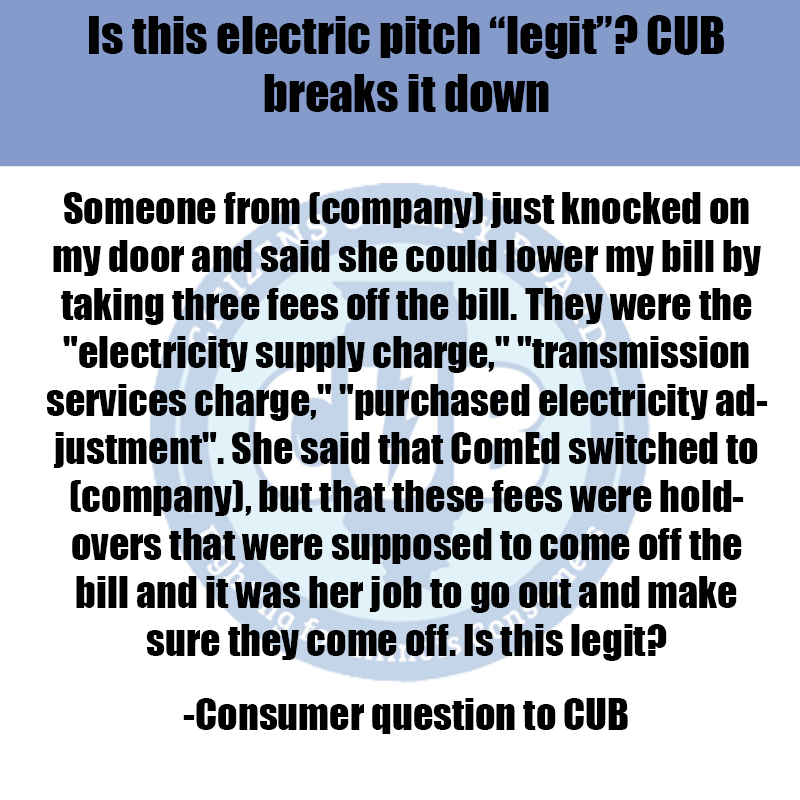Members of CUB’s consumer advocacy department (CAD) take thousands of inquiries each year, so 
they’ve heard all about the crazy pitches consumers receive from alternative electric suppliers.
Last week, Sandra Marcelin-Reme—a veteran of the department—shared one consumer complaint that shows the type of trickery consumers are up against.
Take a look at the pitch the consumer received, and see if you can spot the red flags.
“Someone from (company) just knocked on my door and said she could lower my bill by taking three fees off the bill,” said Josh, a ComEd customer. “They were the ‘electricity supply charge, transmission services charge and purchased electricity adjustment.’ She said that ComEd switched to (company), but that these fees were holdovers that were supposed to come off the bill and it was her job to go out and make sure they come off. Is this legit?”
Did you find them? If not, don’t feel bad! CUB can help you break down what’s wrong with the pitch.
- “Someone from (company) just knocked on my door and said she could lower my bill by taking three fees off the bill.”
First, no alternative supplier can guarantee savings. Second, beware of somebody who claims they can remove fees from your bill. That’s a tactic scam artists use to get your bill and account number. Once in their hands, they can sign you up without your approval. It’s called “slamming.”
Also fees aren’t “removed” when you switch to another supplier. While the labels of the charges may change, you can’t escape paying supply fees. You will be billed by the supplier with its own terminology and at a rate that could be higher than ComEd’s.
There is one exception: The Purchased Electricity Adjustment (PEA) is NOT something that an alternative supplier charges. The PEA is a per kilowatt-hour (kWh) “balancing” line item that assures that ComEd never makes more or less than it paid for power on the market. (Under law, ComEd is not allowed to profit off the supply.)
However, in her spiel, the marketer failed to disclose one big detail about the PEA: It’s either a per-kWh charge or CREDIT that changes monthly. Over the past four months, the PEA has actually been a credit—not a fee.
2. “She said that ComEd switched to (company), but that these fees were holdovers that were supposed to come off the bill and it was her job to go out and make sure they come off.”
This company is just one of many suppliers customers can choose to supply their power. Remember, you do not have to switch to an alternative supplier and your supplier will not switch without your permission. You can always stay with ComEd as your supplier.
Also ComEd does not send people to make sure charges are removed from electric bills. If this were the case, the utility would be mandated to remove the charges from customers’ bills and would not send representatives to thousands of homes to ensure this.
It is not uncommon for less-than-honest sales reps to make it seem like they are providing customers a service instead of pitching a product. Again, do not give out your account information to anyone unless you are prepared to sign up for an offer.
So, to answer Josh’s question, “Is this legit?”
NO, it’s not.
For more information on alternative electric suppliers, get a copy of “CUB’s Guide to Avoiding Electric Rip-offs” emailed to you!

